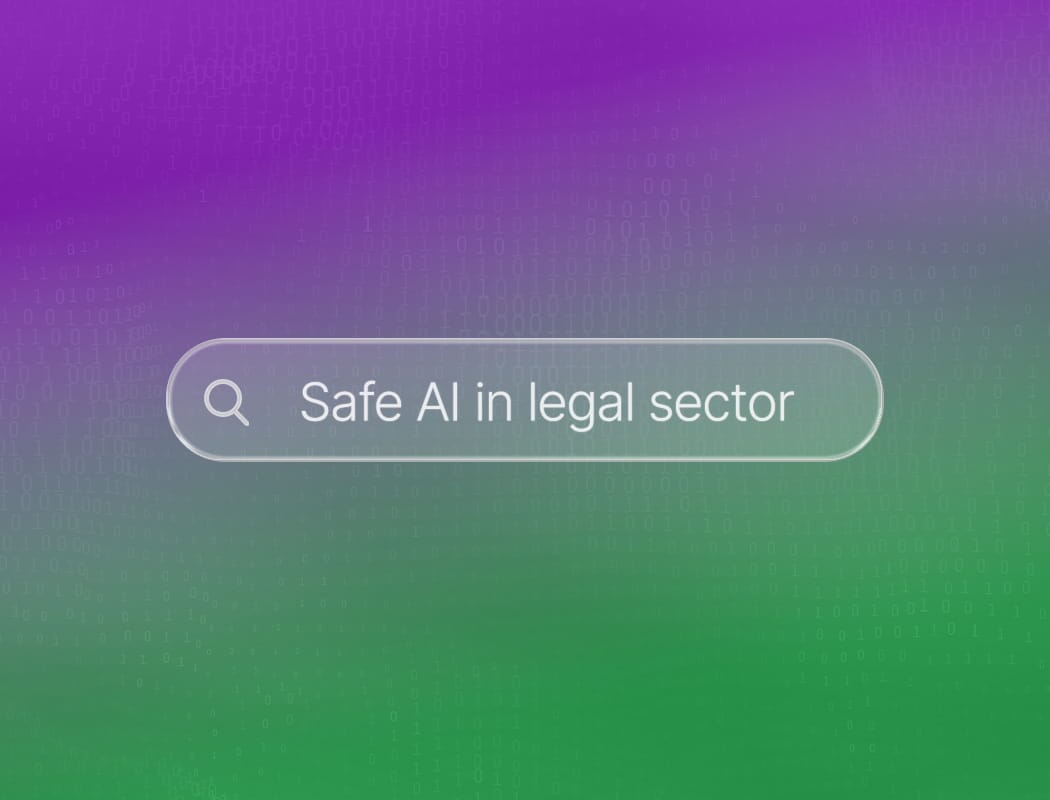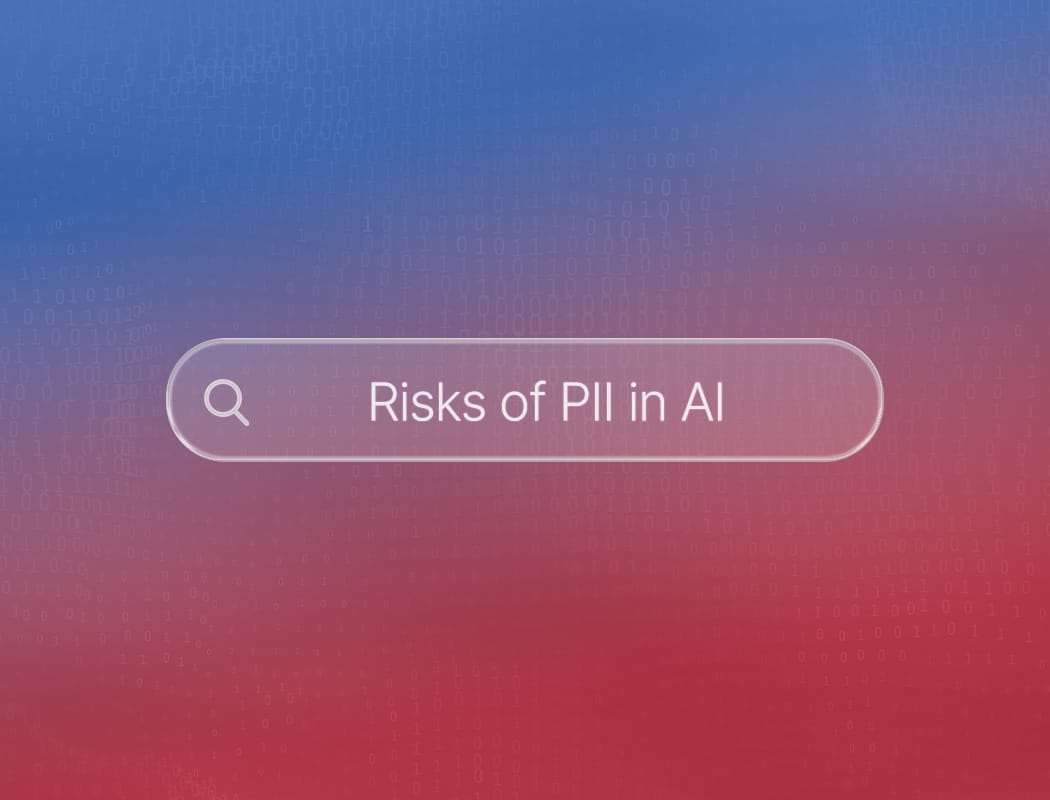How to use AI safely in the legal sector?
Using AI in the legal sector opens up new possibilities, but it also brings unique risks. Lawyers and firms need to be careful about how they use these tools.
- Confidentiality comes first. Client data is among the most sensitive information a lawyer handles. Before adopting any AI tool, confirm that the provider meets the highest security and compliance standards.
- Demand transparency. Many AI tools operate as “black boxes.” If you don’t know how an answer was generated, you can’t properly evaluate its reliability. Insist on systems that explain their reasoning and make it easy to verify sources.
- Challenge the output. AI can sound authoritative while being dangerously wrong, sometimes even citing real cases that don’t support its claims. Treat AI as a powerful assistant, not as a substitute for your own legal judgment. Encourage your team to flag results that feel off.
- Audit regularly. Bias, hallucinations, and outdated information can creep into even the most advanced systems. Schedule routine reviews, update software, and benchmark performance against real-world standards.
When AI is used responsibly, it can help legal teams work smarter, faster, and more effectively The goal is not to replace lawyers with machines, but to combine human judgment with machine efficiency.wing these steps.
The Consequences of over-trusting AI
One of biggest danger in the legal sector is assuming AI outputs are always correct. As the Stanford study on AI in trial shows, even advanced legal research tools still hallucinate, sometimes inventing case law, misquoting statutes, or citing sources incorrectly.
These errors are not harmless. A single hallucinated citation in a brief can lead to sanctions, as one New York lawyer discovered after citing fictional cases generated by ChatGPT.
Misgrounded citations may be even worse: the source exists, but it doesn’t back up the claim. This false sense of credibility makes mistakes harder to detect and more likely to slip through.
Which challenges affect safe AI use in the legal sector?
We now know that, while safe AI in legal industry settings promises efficiency and insight, it also raises questions about trust, privacy, and responsibility.
Law firms and legal departments must navigate these hurdles carefully to ensure that technology serves justice rather than undermines it. Let’s explore in more depth some of the most pressing challenges affecting the safe use of AI in the legal world.
Data privacy and confidentiality
Legal professionals are trusted with sensitive information, from client identities to confidential case details. Introducing AI into this environment means that vast amounts of data are processed, analyzed, and sometimes stored by machines.
The challenge lies in ensuring that this data remains secure and private at all times. Even the most advanced AI systems can be vulnerable to breaches or misuse if not properly managed.
For safe AI in legal industry applications, strict protocols must be in place to prevent unauthorized access and AI must be made to comply with GDPR. Without these safeguards, the risk of exposing privileged information becomes a real concern.
Bias and fairness in decision-making
AI systems learn from data, but that data often reflects human biases, sometimes subtle, sometimes glaring. In the legal sector, where fairness is paramount, even a hint of bias in AI-driven recommendations or predictions can have serious consequences.
Safe AI in legal industry practice requires rigorous testing and ongoing monitoring to identify and correct any skewed outcomes.
This means regularly auditing algorithms, diversifying training data, and involving human oversight at every stage. Only then can legal professionals trust that AI tools are supporting just and equitable decisions.
Transparency and explainability
One of the biggest hurdles for safe AI in legal industry work is the so-called “black box” problem. Many AI models, especially those using deep learning, make decisions in ways that are difficult for humans to understand.
Lawyers and judges need to know how an AI arrived at its conclusions, especially when those conclusions influence legal strategies or court rulings.
Building transparency into AI systems means creating models that can explain their reasoning in clear, accessible terms. This fosters trust and allows legal professionals to confidently rely on AI insights.
Regulatory compliance and accountability
The legal sector operates under strict rules and ethical codes. When AI enters the picture, questions arise about who is responsible if AI makes a mistake. Is it the developer, the law firm, or the end user?
Ensuring safe AI in legal industry settings means establishing clear guidelines for accountability and compliance. Legal teams must stay up to date with evolving regulations and be prepared to demonstrate that their AI tools meet all necessary standards.
How can the legal sector ensure safe AI use?
Ensuring safe AI in the legal industry is not just about compliance or ticking boxes. It’s about protecting clients, upholding ethical standards, and building trust in a rapidly changing world.
So how can law firms and legal professionals make sure their use of AI is both effective and secure? Let’s explore some practical steps.
Establish clear guidelines for AI adoption
Before diving into the world of AI, law firms need to set out clear rules for how these tools will be used. This means creating policies that outline what types of AI are acceptable, who can use them, and for what purposes.
These guidelines should address privacy concerns, data protection, and the specific needs of the legal sector. By putting these rules in writing, firms can help ensure that everyone understands the boundaries and responsibilities involved.
Prioritize data security and confidentiality
Legal work is built on trust and confidentiality. When using AI, it’s essential to protect sensitive client information at every step. This involves choosing AI solutions that meet strict security standards and regularly reviewing those systems for vulnerabilities.
Encryption, access controls, and regular audits should become part of the routine. Staff must also be trained to recognize potential threats, such as phishing attempts or data leaks.
By making data security a top priority, law firms can reduce the risk of breaches and maintain their clients’ confidence in safe AI practices.
Monitor and audit AI decision-making
AI can process vast amounts of information quickly, but it isn’t perfect. Sometimes, algorithms make errors or show bias. That’s why it’s important to monitor how AI tools are making decisions, especially when those decisions could impact a case or a client’s future.
Regular audits can help identify patterns or errors that might otherwise go unnoticed. If something seems off, there should be a clear process for investigating and correcting it.
Invest in ongoing education and collaboration
The world of AI is always evolving, and so are the risks and opportunities it brings. Legal professionals need to stay informed about the latest developments, best practices, and regulatory changes. This means investing in training for staff at all levels, from junior associates to senior partners.
Collaboration is also vital. Law firms should work together with technology experts, regulators, and even clients to share knowledge and develop better safeguards. By fostering a culture of learning and openness, the legal sector can continue to innovate while keeping safe AI in legal industry applications front and center.
What benefits does safe AI use bring to the legal sector?
When AI is used responsibly, it doesn’t just make lawyers’ lives easier, it can make the entire legal process more reliable and trustworthy. Let’s explore how AI, when used responsibly, can simplify legal work and improve efficiency.
Enhanced efficiency and time savings
One of the most immediate benefits of safe AI use in the legal sector is the dramatic boost in efficiency. Legal professionals spend countless hours reviewing documents, searching for precedents, and drafting contracts.
Safe AI tools can automate much of this repetitive work, freeing up valuable time for lawyers to focus on strategy and client interaction. For example, AI-powered document review systems can scan thousands of pages in minutes, flagging relevant information and potential issues.
This doesn’t just speed things up, it also reduces the risk of human error. With more time on their hands, legal teams can take on more cases or dedicate extra attention to complex matters, all while maintaining high standards of quality.
Improved accuracy and reduced risk
Accuracy is everything in the legal world. A single mistake can have serious consequences for clients and firms alike. Safe AI systems are designed to minimize these risks by consistently applying rules and checking for inconsistencies.
Unlike humans, AI doesn’t get tired or distracted, which means it can catch errors that might otherwise slip through the cracks. For instance, AI can cross-reference case law, statutes, and contracts to ensure that every detail lines up correctly.
This level of precision helps lawyers avoid costly mistakes and ensures that their advice is always based on the most up-to-date information. In the end, safe AI use leads to better outcomes for everyone involved.
Better client service and accessibility
At the end of the day, the legal sector exists to serve clients. Safe AI use allows law firms to deliver faster, more accurate, and more personalized service than ever before.
Chatbots and virtual assistants can answer routine questions around the clock, making legal help more accessible to people who might not otherwise be able to afford it.
AI-driven insights can also help lawyers tailor their advice to each client’s unique situation, leading to better results and higher satisfaction.





